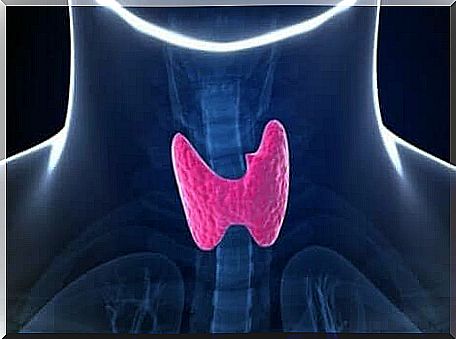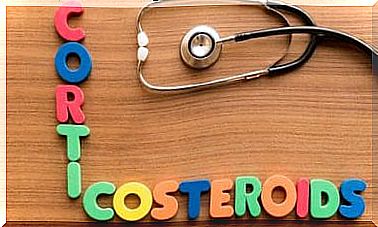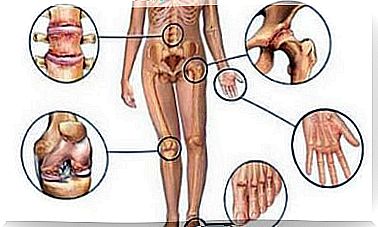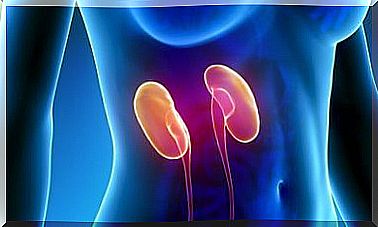What Are The Reasons For A Low TSH Value?
The thyroid stimulating hormone (TSH), also called thyrotropin, stimulates the thyroid gland to produce thyroid hormones. If there is an imbalance, this manifests itself in problems that can result in both an underactive and an overactive thyroid.

Thyroid stimulating hormone (TSH) is a molecule that is involved in possible thyroid dysfunction. As a result, if doctors detect certain symptoms related to this organ, they will do a test that measures the level of TSH in the blood.
A low TSH level indicates a change that needs further investigation. For this reason, further tests often follow.
Thyroid Stimulating Hormone (TSH): Definition
The term TSH stands for thyroid-stimulating hormone and is also known as thyrotropin in technical terms. It is released by the pituitary gland after it receives a stimulus from the hypothalamus via another hormone called thyrotropin-releasing hormone (TRH).
Once TSH is in the blood, it stimulates the production of two more hormones:
- T3 or triiodothyronine. It is one of the two main thyroid hormones and much more active than T4; it is the hormone that affects tissues and regulates their metabolism.
- T4 or thyroxine. Besides T3, it is the other important thyroid hormone; it has minimal tissue impact. It is more of a T3 reservoir because when T4 reaches the tissues it can be converted to T3 which will do the final action.
T3 and T4 enter the tissues to control the metabolism of proteins, carbohydrates and fats. In addition, these hormones are of great importance to babies as they aid the normal development of a newborn’s brain tissue.

Why does the TSH level in the blood decrease?
According to a study published in 2017 that involved around 4,550 people between the ages of 18 and 93, the incidence of hypothyroidism was 9.1%. Similarly, the incidence of hyperthyroidism was 0.8%.
Together, these two disorders affect nearly 10% of the population and it would be possible to find abnormal TSH levels in all of these patients. Said hormone is regulated in 3 ways:
- With the amount of TRH released by the hypothalamus.
- Through the pituitary gland, which is responsible for storing and possibly releasing TSH.
- Due to the negative feedback from thyroid hormones.
What is the negative feedback?
The number of T3 and T4 in the blood increases when the production of thyroid hormones is increased. Both the hypothalamus and the pituitary gland recognize this increase and reduce their production of TRH and TSH. This process is known as negative feedback.
That is, the hormones regulate themselves to maintain stable blood levels. Without this mechanism, we would be constantly switching into an overactive or underactive thyroid mode.
The level of TSH in the blood
Normal TSH values in the blood are between 0.4 and 4 mIU / l. If these values are higher or lower, you have thyroid dysfunction.
A low TSH level means that there is so much T3 and T4 in the blood that there is negative feedback to the pituitary gland, which prevents further production. This is commonly referred to as an overactive thyroid.
On the other hand, low TSH levels can also be the result of secondary hypothyroidism and occurs when the pituitary gland is dysfunctional, either because part of it has been destroyed or something is preventing it from functioning properly, such as a brain tumor.
Ultimately, tertiary hypothyroidism can be the cause of low TSH levels. This means that the function of the hypothalamus is disturbed and it no longer produces TRH. As a result, it also doesn’t send signals to the pituitary gland to produce TSH.
When there is overproduction of peripheral thyroid hormones, as we saw in the first case, the T3 and T4 levels in the blood are increased, which suggests that the metabolism is working too hard. As a result, the body begins to burn all of the fats and sugars in the body for energy.
Treatment of disorders related to thyroid stimulating hormone
The TSH value in an overactive thyroid
Some of the symptoms of an overactive thyroid are nervousness, palpitations, hyperactivity, and increased sweating. There is also hypersensitivity to heat, increased appetite and weight loss.
Contact your doctor if you think you may have an overactive thyroid. He will then do appropriate blood tests to check your TSH, T3, and T4 levels. Your doctor will diagnose hyperthyroidism if TSH levels are low and thyroid hormones are high.
The causes of an overactive thyroid can range from a thyroid tumor to an autoimmune disease in which the antibodies produced overly stimulate the thyroid cells. However, there are medications available to help relieve and control symptoms.

The TSH value in the case of an underactive thyroid
Symptoms that are in contrast to the above, such as fatigue, weight gain, cold intolerance and hypothermia indicate an underactive thyroid. You may have a brain tumor that either destroys or compresses the pituitary gland, preventing TSH from being released. However, this may also be due to the low production of T3 and T4 in the gland itself.
Low TSH levels associated with an underactive thyroid indicates a serious problem – one related to pituitary gland destruction. On the other hand, if TSH levels are normal or high, the thyroid could be to blame instead.









